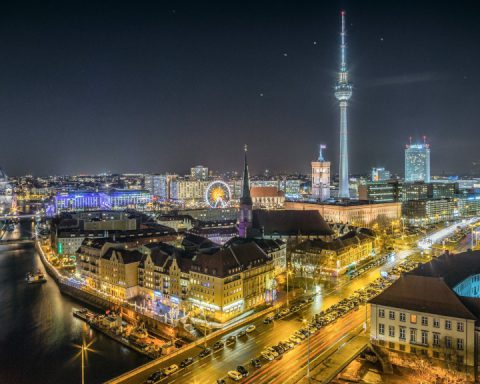The rise of the Pegida movement, a xenophobic political movement campaigning against Islamic immigration and the growing multiculturalism of European society, has worried many in Germany. Politicians identifying with Pegida have taken over the right-wing Alternative für Deutschland (AfD) German political party after one of its original founders, Bernd Lucke, split from the party because of disagreements with the growing xenophobic orientation of other party leaders. However, this movement has shown its ability to move masses in Saxony, in the city of Dresden in particular, and it is unclear whether taking over the AfD and pushing the ordoliberals out will allow them to pass the five percent popular vote benchmark in the next parliamentary election, which is necessary to get representation in the Bundestag.
It is interesting that this xenophobic movement is strongest in the German federal state with the lowest proportion of foreigners.
And blaming economic conditions as the cause for producing besorgte Bürger (disgruntled citizens) who channel their frustrations against foreigners is not very convincing, since Saxony (although one of the poorest German federal states) is not a Third World country and has a relatively good standard of living. A more plausible explanation could be that conservative Germans isolated from the outside world become distressed at the changing German society and the breakdown of the white-Christian-patriarchal-nationalist narrative.
They see mom-and-pop shops owned and operated by Middle Eastern immigrants, and they can’t believe the sight of dark-skinned football players like Özil, Boateng, and Khedira lifting the World Cup alongside Lahm and Schweinsteiger. Thus, people like the organizers of Pegida come to supply this group of people with what they demand: xenophobia. In the process, they gain political capital and try to pass the five percent benchmark to enjoy the perks of being in government for the low price of making a sensationalist show in Berlin.
-

Donald Trump speaking at the 2015 Conservative Political Action Conference (CPAC). By Gage Skidmore. Licensed under CC BY-SA 3.0 via Wikimedia Commons.
What is more interesting is that a true showman on the other side of the Atlantic is already building sizeable amounts of political capital by appealing to the isolated conservative heart of America. The Republican Party’s presidential hopeful, Donald Trump, made open xenophobia and racism the core of his political campaign. Like people in Saxony, American conservatives are not, for the most part, in economically dire situations, forcing them to choose radical options.
These people are also distressed by the pace of social change and the breakdown of the white-Christian-patriarchal-nationalist narrative.
In the United States conservatives have recently been dealt a series of blows with events such as the upholding by the Supreme Court of the health-care reform law commonly known as Obamacare, the re-establishment of diplomatic relations with Cuba, the federal legalization of same-sex marriage, and the international nuclear deal with Iran. This is on top of the fact that the American president is black, the Democratic Party’s frontrunner is a woman, and the wife of Jeb Bush (another Republican presidential hopeful with good chances of securing the party’s nomination) is Mexican.
However, I am not arguing that Trump copied Pegida’s political agenda. It is important to clarify that what is new in Trump’s strategy is its bluntness, but not the strategy itself. For six American presidential terms (from 1968 to 1992) the Republican Party secured the White House five out of six times by appealing to the “Southern Strategy.” Officially, the Republican Party said that it was responding to the needs of the so-called silent majority: The traditional heartland of America who embraced conservative American values about liberty, the family, and Christianity. However, this strategy aimed at securing the votes of the “Bible Belt.”
This period (the second half of the 20th century) saw the consolidation of the Civil Rights Movement ending racial segregation, the legalization of abortion, the prohibition of school prayer, the success of the anti-war movement, the sexual revolution and the rise of the feminist movement. In fact, the Confederate flag was placed in front of South Carolina’s State Capitol (although it has not been the official state flag) during the 1960s to protest the Civil Rights Movement and especially racial equality (the flag was subsequently taken down after last June’s shooting at a black Christian church in South Carolina).
Therefore, Pegida in Germany may be copying the “Southern Strategy” and not the other way around.
Even if this is the case, it does not guarantee major success. In America, this political strategy has not been very successful during the last six presidential terms (from 1992 to 2016). During this period, the Republicans have only secured the White House two out of six times, and won the popular vote one out of six times. It seems that younger generations are too “northern” to find the southern strategy appealing. In America, Donald Trump has climbed to the top of the early polls for the Republican nomination. And in Germany a sizeable but still minority portion of the population has xenophobic or racist tendencies. The question is if the Pegida or the Trump strategies have long-term staying power or if their impact is only temporary or sporadic.
-

Neo-nationalist protests in Freital, LVZ-Online, http://goo.gl/3iRAoC
From the looks of it, neither the U.S. nor Germany will be taken over by xenophobic political movements since they are far away from wielding the majority in any case. However, they do appeal to a sizeable minority of the population disgruntled and distressed by the pace of social change and the crumbling of their nationalist narrative, which might give them the staying power in federal politics. In the end, that might be their goal.
In Germany, Pegida, now in charge of the AfD, will try to rally the radical conservatives to pass the five percent vote benchmark in the 2017 parliamentary elections. In the U.S., Donald Trump is very unlikely to be able to win the American presidency and does not have a party to enter Congress, but he does have money to run a mammoth campaign. Securing a good chunk of the popular vote in the Republican primaries might give him the leverage to piggyback to a position in Washington on whoever wins the Republican nomination. What has become clear so far is that Trump’s re-packaging of the “Southern Strategy” of open xenophobia has turned him into America’s Pegida.









